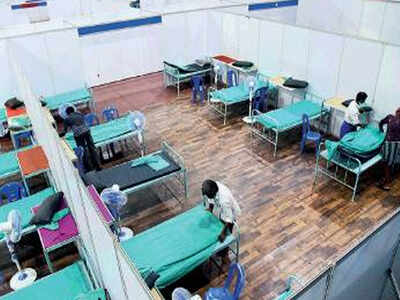- News
- City News
- hubballi News
- Karnataka: No takers for beds in Covid Care Centres
Karnataka: No takers for beds in Covid Care Centres

Experts say rather than waste funds on CCCs, the government should focus on increasing ICU and oxygenated beds.
BENGALURU: Although there are very few takers for these beds, the state government and many private organisations are busy setting up Covid Care Centres (CCC) across the state. CCCs are meant for mild or asymptomatic patients and the aim is to reduce the burden on hospitals.
Health department officials say CCCs with a total 10,000 beds have been set up across the state over the past two weeks, but very few have oxygenated beds. As a result, less than 30% of beds across CCCs are occupied. In Bengaluru alone, there are around 2,500 beds in about 30 CCCs, including 500 oxygenated beds. In all, only 750 beds are occupied.
A staffer at a CCCs at a government maternity home in Bengaluru said people prefer home isolation to CCCs. The fear of being separated from family is a contributing factor and many patients feel it is safer to admit patients in a hospital than CCC since patients are assured of treatment in a hospital if their condition suddenly deteriorates.
“On Monday, a patient whose platelet count was dropping was referred to our CCC which has an oxygenated bed. The hospital which referred the patient had no beds available. But family members refused to admit the patient in the CCC,” said a manager of CCC in Dharwad.
Even during the first Covid-19 wave last year, the government had opened a 10,000-bed centre at Bengaluru International Exhibition Centre. But through the year, not even 10% of beds were occupied. Moreover, by the time the government opened what was described as the country’s biggest CCC, the Covid curve was flattened, forcing the government to shut it down.
Many health experts say instead of opening CCCs and wasting funds, the government should focus on increasing oxygenated beds and roping in more doctors and nursing staff. It must also evolve a mechanism where patients with mild symptoms are treated at home and only the very ill are shifted to hospitals.
“By doing so we can reduce the burden on hospitals. The government must also focus on creating more ICU beds which is the need of the hour,” said a doctor at Ballari district hospital.
The state ministerial task force headed by deputy chief minister Ashwath Narayana said the demand in Bengaluru city was for about 7,000 beds daily. “To put a check on those who get unnecessarily hospitalised, triaging of these bed-seekers will be done in 60 lakh level-one centres and level-two centres.” Officials say level-one centres include maternity homes and medical colleges and CCCs, while public healthcare centres have been identified as leveltwo. Narayan said the number of beds required daily might reduce further with effective triaging.
Health department officials say CCCs with a total 10,000 beds have been set up across the state over the past two weeks, but very few have oxygenated beds. As a result, less than 30% of beds across CCCs are occupied. In Bengaluru alone, there are around 2,500 beds in about 30 CCCs, including 500 oxygenated beds. In all, only 750 beds are occupied.
A staffer at a CCCs at a government maternity home in Bengaluru said people prefer home isolation to CCCs. The fear of being separated from family is a contributing factor and many patients feel it is safer to admit patients in a hospital than CCC since patients are assured of treatment in a hospital if their condition suddenly deteriorates.
“On Monday, a patient whose platelet count was dropping was referred to our CCC which has an oxygenated bed. The hospital which referred the patient had no beds available. But family members refused to admit the patient in the CCC,” said a manager of CCC in Dharwad.
Even during the first Covid-19 wave last year, the government had opened a 10,000-bed centre at Bengaluru International Exhibition Centre. But through the year, not even 10% of beds were occupied. Moreover, by the time the government opened what was described as the country’s biggest CCC, the Covid curve was flattened, forcing the government to shut it down.
Many health experts say instead of opening CCCs and wasting funds, the government should focus on increasing oxygenated beds and roping in more doctors and nursing staff. It must also evolve a mechanism where patients with mild symptoms are treated at home and only the very ill are shifted to hospitals.
“By doing so we can reduce the burden on hospitals. The government must also focus on creating more ICU beds which is the need of the hour,” said a doctor at Ballari district hospital.
The state ministerial task force headed by deputy chief minister Ashwath Narayana said the demand in Bengaluru city was for about 7,000 beds daily. “To put a check on those who get unnecessarily hospitalised, triaging of these bed-seekers will be done in 60 lakh level-one centres and level-two centres.” Officials say level-one centres include maternity homes and medical colleges and CCCs, while public healthcare centres have been identified as leveltwo. Narayan said the number of beds required daily might reduce further with effective triaging.
FacebookTwitterLinkedinEMail
Start a Conversation
end of article
Trending Topics
Top Stories Right Now
- indiaDrones to minesweepers: Cash crunch forces military to take equipment on lease
- indiaCovid-19: Active cases drop for 3rd day but deaths touch record 4.2k
- indiaCovid live: Covaxin gets nod for phase 2, 3 clinical trials on 2-18 yr olds
- indiaHitting the heartland: Covid cases surge in small towns and villages
- cityBihar, UP blame each other for bodies on Ganga
Quick Links
Delhi Air PollutionDelhi TemperatureChennai WeatherBangalore TemperatureCovid vaccination centres in DelhiCoronavirus in DelhiRTPCR test in GurgaonHyderabad RainPollution level in BangaloreDelhi SmogDelhi TemperatureNoida AQIGurgaon AQI todayFire in MumbaiMumbai RainsCovid 19 RT PCR Test in NoidaDelhi AQI todaySrinagar encounter
